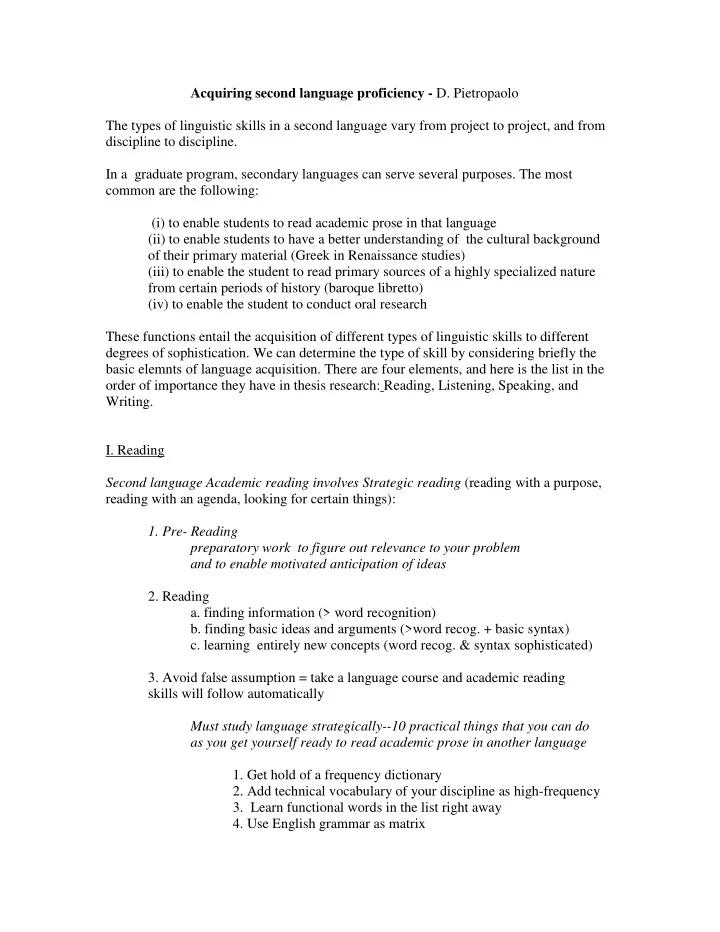

Acquiring second language proficiency - D. Pietropaolo The types of linguistic skills in a second language vary from project to project, and from discipline to discipline. In a graduate program, secondary languages can serve several purposes. The most common are the following: (i) to enable students to read academic prose in that language (ii) to enable students to have a better understanding of the cultural background of their primary material (Greek in Renaissance studies) (iii) to enable the student to read primary sources of a highly specialized nature from certain periods of history (baroque libretto) (iv) to enable the student to conduct oral research These functions entail the acquisition of different types of linguistic skills to different degrees of sophistication. We can determine the type of skill by considering briefly the basic elemnts of language acquisition. There are four elements, and here is the list in the order of importance they have in thesis research: Reading, Listening, Speaking, and Writing. I. Reading Second language Academic reading involves Strategic reading (reading with a purpose, reading with an agenda, looking for certain things): 1. Pre- Reading preparatory work to figure out relevance to your problem and to enable motivated anticipation of ideas 2. Reading a. finding information (> word recognition) b. finding basic ideas and arguments (>word recog. + basic syntax) c. learning entirely new concepts (word recog. & syntax sophisticated) 3. Avoid false assumption = take a language course and academic reading skills will follow automatically Must study language strategically--10 practical things that you can do as you get yourself ready to read academic prose in another language 1. Get hold of a frequency dictionary 2. Add technical vocabulary of your discipline as high-frequency 3. Learn functional words in the list right away 4. Use English grammar as matrix
6. Practice metaphrasing for syntactical facilitation 7. Begin reading after your first classes 8. Omit composition-based grammar 9. Omit phonology and prosody 10. Translate as much as you can II. Comprehension Second Language Academic Listening ( = listening for academic purposes) Basic problem > visual and phonetic recognition of words. 1. Listening to academic lectures and conference presentations 2. Interviewing subjects and listening to conversations 1. Listening to academic prose requires a good knowldge of vocabulary and grammar. It is analogous to reading academic prose. 2. Interviews and conversations are usually the result of a series of scripted questions. Listening proficiency involves: 1.Familiarity with pronunciation and mode of speech (fast/slow, clear/slurred) 2. Vocabulary recognition in speech with syncopated syllables 3. The function of intonation (he called me / he called me ) 4.Grasping word separation 5. Familiarity with discourse markers 6.Colloquialisms and slang 7.Interrupted syntax, embedded clauses 8. Incomplete sentences What can you do to acquire this skill - study the language strategically 1. listen to podcasts of lectures on a theme with which you are familiar 2. Watch dubbed films with which you are familiar. 3. As you get better, watch films that are not familiar to you, and then test your understanding 4. Listen to the radio - talk shows 5. Become throughly familiar with different ways of pronouncing the key words in your research. III. Speaking for research purposes Learn to ask questions Learn to react to linguistic signs
IV - Institutional responsibility 1. Program structure: admission criteria must spell out the linguistic requirements 2. Establish a second language institute for graduate students -financed centrally -organized according to the skills required -summer, intensive.
Recommend
More recommend